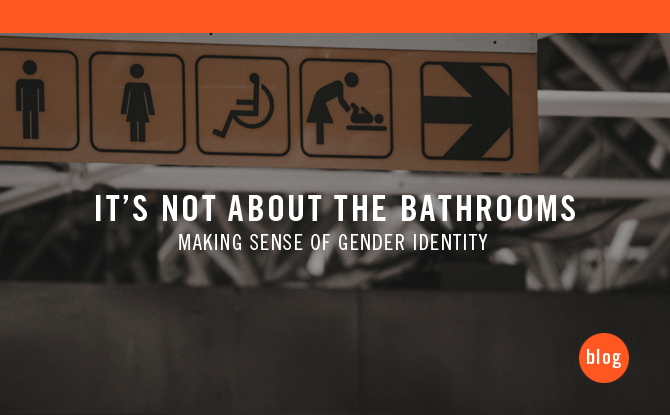by Lieschen Venter
In March of 2016, North Carolina signed a bathroom bill into law that applies to all of the state’s public schools. This bill specifies that students must use the bathroom which corresponds to the gender on their birth certificate and was created in response to a local ordinance in the city of Charlotte, which allowed transgender students to use a bathroom consistent with their gender identity. The US national retail chain, Target, took the opposite approach by allowing transgender customers and staff use of the bathroom that most closely corresponds with their gender identity.
Gender identity is a fairly new concept where one’s gender is redefined to be separate from one’s sex (the shape of your genitals) and sexual orientation (the shape of another’s that you prefer for intimacy). Your gender is your personal self-identification as male, or female, or both, or neither as expressed through the social norms of your culture. A transgender person is one whose self-identity does not conform unambiguously to conventional notions of male or female gender – the body does not match the identity.
Of course the bathroom bill has led to heated debate and polarisation. Proponents of the bill choose a strategy of fear mongering by making safety their main argument. Allowing everyone to share the same bathroom facilities, they claim, will cause an unprecedented number of sexual abuse cases. Opponents of the bill, on the other hand, have resorted to virtue signalling and have branded the bill transphobic. This sets up a tricky false dilemma for the Christian trying to maintain a Biblical worldview as the world demands to know why he even has an opinion about where strangers relieve themselves. His focus cannot be on determining which camp to join. No, it should not be on the topical two-sided controversy but he must instead look at what is fertilizing the root of this societal scuffle.
“God is dead and we have killed him”, Nietzsche declared in 1882 referring to the end of the western world’s reliance on religion as a moral compass and source of meaning. In 1992, Justice Anthony Kennedy of the US Supreme Court said, “At the heart of liberty is the right to define one’s own concept of existence, of meaning, of the universe, and of the mystery of human life.” It is an understanding of this autonomy – the defining of one’s own existence – that gives the Christian insight into issues of our time.
We live in a humanistic society where we attach prime importance to man and his capacity for self-realization. Having declared ourselves independent from a Creator, we are drunk on the “liberty” and the possibilities of defining our characters and personalities. In this independence, life has no inherent meaning or value. Any meaning must be manufactured and identity must be chosen for it to exist at all, and it is here where things fall apart.
How can we know who we are? “Follow your heart”, the world encourages, “look deep within to find yourself”. But when we look, we find exactly what Jeremiah warned we would: a heart that is deceitful above all things and desperately wicked. Separated from God, the heart convinces us that we are 50-year old children, or a cat in a human body, or a white African-American, or a woman trapped in a famous man’s body. It convinces us to turn inwards and in our self-fetishisation crave intimacy with our own sex. Or it convinces us to objectify and idolize the opposite sex’s shape to a level where we cannot rest until our own shape has been altered into it. It is man’s total depravity that makes it impossible for him to define himself.
Should Christians fight against the institution of transgender bathrooms? It’s not about the bathrooms. The Christian’s concern is not for himself having to share a bathroom with someone whose identity is alien to him. His concern is for the person who has separated so far from his Creator that his own real identity has become alien to himself. And his concern is even more so for a system that seeks to encourage this alienation rather than remedy it.
When these issues arise in South Africa, I hope believers will be able to address the real problem. I hope that we will lead hearts and minds back to great and beautiful and glorious alternative views of reality rather than the ones offered by the world. We are created in God’s image, created male and female, created so that we can enjoy all that He is and all that He’s done, and created to fulfil His eternal plan. Let us be absolutely convinced of our adoption and our being grafted onto the true Root. And let us know and share the Creator and the Source, the good and perfect beginning and end of our identity, our purpose, meaning and destiny. God is alive and we are determined by Him.
